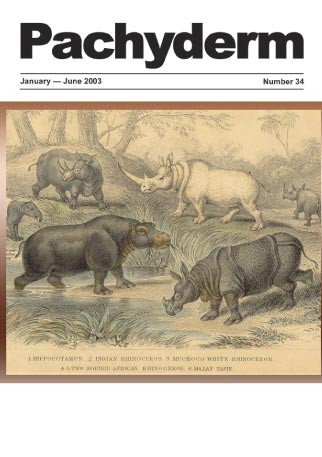Preliminary results on movements of a radio-collared elephant in Lobéké National Park, south-east Cameroon
DOI:
https://doi.org/10.69649/pachyderm.v34i1.1133Abstract
Athough actual numbers and movements are unclear the south east region of Cameroon harbours a significant population of forest elephants. Preliminary results from data collected for 8 months from a 5 year old male forest elephant radio collared in March 2001 suggest that elephants spent more time in the forest in the logging concessions and professional hunting zones that they did in the Lobeke NP itself. Initial results from the telemetry programme, which was part of WWF's Jengi project, confirm the need to step up protection efforts including anti-poaching patrols to curb the poaching and illegal ivory trade opportunities that are common within the logging concessions. Further monitoring on radio collared elephant will assist in determining important corridors and migratory routes within the trans-boundary conservation programme region involving contiguous protected areas in this region including the Dzanga-Sangha in Central African Republic, and Nouabale Ndoki NP in the Congo (where at least 3 elephant have been radio collared).
Downloads
Published
How to Cite
Issue
Section
License
Copyright (c) 2003 Leonard Usongo

This work is licensed under a Creative Commons Attribution-NonCommercial 4.0 International License.




